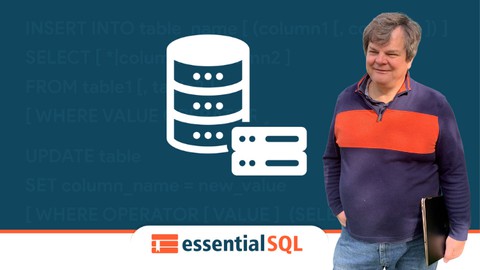
EssentialSQL: Subquery Magic – Master SQL Sub Queries.
EssentialSQL: Subquery Magic – Master SQL Sub Queries., available at $74.99, has an average rating of 4.45, with 22 lectures, 24 quizzes, based on 415 reviews, and has 3750 subscribers.
You will learn about Write subqueries to select data from multiple tables. Create subqueries to return a single value or multiple values. Use subqueries in the SELECT, FROM, WHERE, and HAVING clauses. Understand and use correlated subqueries, which depend on values from the outer query. Use subqueries to solve problems such as finding maximum or minimum values and records that don't have corresponding entries in other tables. Understand the difference between IN, EXISTS, and ANY/ALL operators in subqueries. How to use subqueries to create more complex queries and better understand the structure and relationships in a database. This course is ideal for individuals who are Beginner SQL query authors curious about subqueries. or If you're struck writing subqueries or baffled by correlated subqueries, then this course is for you! or Business analysts looking more ways to write queries or Recent college graduates looking to hone their SQL skills or Job applicants looking for that extra edge with their next interview! It is particularly useful for Beginner SQL query authors curious about subqueries. or If you're struck writing subqueries or baffled by correlated subqueries, then this course is for you! or Business analysts looking more ways to write queries or Recent college graduates looking to hone their SQL skills or Job applicants looking for that extra edge with their next interview!.
Enroll now: EssentialSQL: Subquery Magic – Master SQL Sub Queries.
Summary
Title: EssentialSQL: Subquery Magic – Master SQL Sub Queries.
Price: $74.99
Average Rating: 4.45
Number of Lectures: 22
Number of Quizzes: 24
Number of Published Lectures: 22
Number of Published Quizzes: 24
Number of Curriculum Items: 46
Number of Published Curriculum Objects: 46
Original Price: $89.99
Quality Status: approved
Status: Live
What You Will Learn
- Write subqueries to select data from multiple tables.
- Create subqueries to return a single value or multiple values.
- Use subqueries in the SELECT, FROM, WHERE, and HAVING clauses.
- Understand and use correlated subqueries, which depend on values from the outer query.
- Use subqueries to solve problems such as finding maximum or minimum values and records that don't have corresponding entries in other tables.
- Understand the difference between IN, EXISTS, and ANY/ALL operators in subqueries.
- How to use subqueries to create more complex queries and better understand the structure and relationships in a database.
Who Should Attend
- Beginner SQL query authors curious about subqueries.
- If you're struck writing subqueries or baffled by correlated subqueries, then this course is for you!
- Business analysts looking more ways to write queries
- Recent college graduates looking to hone their SQL skills
- Job applicants looking for that extra edge with their next interview!
Target Audiences
- Beginner SQL query authors curious about subqueries.
- If you're struck writing subqueries or baffled by correlated subqueries, then this course is for you!
- Business analysts looking more ways to write queries
- Recent college graduates looking to hone their SQL skills
- Job applicants looking for that extra edge with their next interview!
In this course, you will learn the fundamentals of subqueries and how to use them effectively in your MySql, PostgreSQL, or MS SQL Server SQL statements. You will learn about different types of subqueries, including correlated and uncorrelated subqueries, and how to use them to solve complex problems. You will also learn about common pitfalls to avoid when working with subqueries, and how to optimize their performance in your queries.
By the end of this course, you will have a solid understanding of how to use subqueries in your SQL statements, and be able to apply this knowledge to a wide range of real-world scenarios.
In this Course you will Learn to:
-
Know and understand subqueries.
-
Identify subqueries in SQL.
-
Use subqueries in your select statement to make your queries more robust and less reliant on hard coded values.
-
Harness the power of derived tables to work around SQL limitations. Derived tables are also known as subqueries in the FROM clause.
-
Use subqueries in the WHERE clause with EXISTS and IN
-
Use subqueries with SUM, MAX and other Aggregate functions in GROUP BY and HAVING.
-
Write correlated subqueries so that your subquery is able work with the outer query to become more flexible and robust.
Nothing is worse than
-
Being excited to learn something new but not knowing where to start.
-
Wasting time learning the wrong features.
-
Being overwhelmed with options and not know which to use.
Imagine Having…
-
Knowledge – Knowing how to quickly use subqueries to take your SQL to the next level.
-
Confidence – Feeling good that you’re on the right track.
-
Accomplishment – Having a sense of accomplishment that you’ve learned something most cannot.
-
Fun – Actually having fun learning SQL subqueries!
By the time you’ve completed this SQL course you’ll have an appreciation of subqueries, overcome your fear, and able to write correlated queries to make your SQL more robust.
Course Curriculum
Chapter 1: Introduction
Lecture 1: Welcome to Subquery Magic
Lecture 2: What is a Subquery?
Chapter 2: Setting Up Your Learning Lab
Lecture 1: Should I use SQL Server, MySQL or PostgreSQL to Learn Subqueries?
Lecture 2: Using the Pizza DB in this Course
Lecture 3: Using the Pizza DB with SQL Server
Lecture 4: Using the Pizza DB with MySQL
Lecture 5: Using the Pizza DB with PostgreSQL
Chapter 3: Writing your First Subquery
Lecture 1: Place a subquery in the column list
Lecture 2: Incorporate Subqueries into Expressions
Chapter 4: Create Correlated Subqueries
Lecture 1: Demystify Correlated Subqueries
Lecture 2: Demystify Correlated Subqueries – Example
Lecture 3: Write a Correlated Subquery with Two Tables
Lecture 4: Do you have any questions?
Lecture 5: Correlated subqueries versus Inner Joins, which is better?
Chapter 5: Create Subqueries in the WHERE and HAVING Clauses
Lecture 1: Get Existential with Exists
Lecture 2: Are you in? Use the IN Condition to Test for Membership
Lecture 3: Subquery in the Having Clause
Lecture 4: Get fancy and write a correlated subquery in the HAVING clause
Lecture 5: Get fancy and write a correlated subquery in the HAVING clause – Part B
Chapter 6: Write Queries using Derived Tables
Lecture 1: What is a Derived Table?
Lecture 2: Joining Derived Tables
Chapter 7: Wrap-up
Lecture 1: Bonus Lecture
Instructors
-

Kris Wenzel
Let me teach you SQL using simple to understand English. -

Essential Sql
Learn everything you need to use SQL in your next project
Rating Distribution
- 1 stars: 3 votes
- 2 stars: 6 votes
- 3 stars: 58 votes
- 4 stars: 165 votes
- 5 stars: 183 votes
Frequently Asked Questions
How long do I have access to the course materials?
You can view and review the lecture materials indefinitely, like an on-demand channel.
Can I take my courses with me wherever I go?
Definitely! If you have an internet connection, courses on Udemy are available on any device at any time. If you don’t have an internet connection, some instructors also let their students download course lectures. That’s up to the instructor though, so make sure you get on their good side!
You may also like
- Strategic Communication for Startups
- Mastering the Art of Running a Faceless YouTube Channel
- ChatGPT Business Master Class Video + eBook Prompt Cheats
- 6-Figure Speaker: The Professional Speaker Blueprint
- Master Course in Restaurant Business & Restaurant Management
- Master Course : Data Lakehouse Fundamentals in Data Science
- RESULTS-BASED MANAGEMENT, MONITORING & EVALUATION
- Turnaround Management – 2M Money
- Selective Inventory Control Techniques in Supply Chain
- Accredited Agile Roles – Product Owner
- Conflict Management and De-Escalation in Customer Service
- iGNLP™ Certified Certificate in Chaining Anchors
- PMP Certification exam Questions For Practice & Explanation
- Pipedrive Masterclass: Turbocharge Sales & Retain Clients
- ACCA (F4) : Corporate & Business Law (ENG) – Complete Course
- Certification of Capability in Business Analysis (CCBA) prep
- Demand Forecasting
- Fiverr Freelancing Bootcamp: Rank your gig with SEO tool
- Diversity Equity & Inclusion Hiring, Recruiting, & Sourcing
- Introduction to Real Estate Investor Financing




















